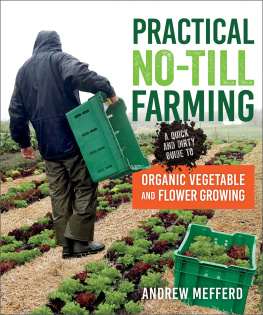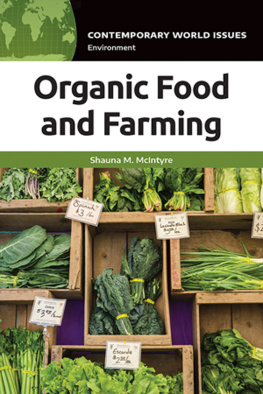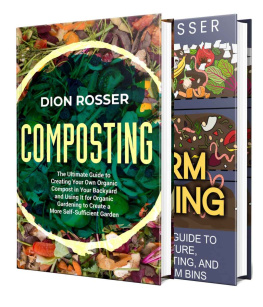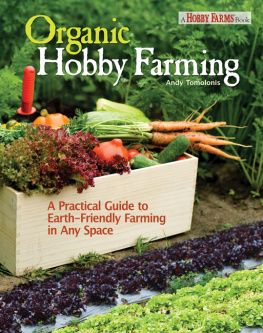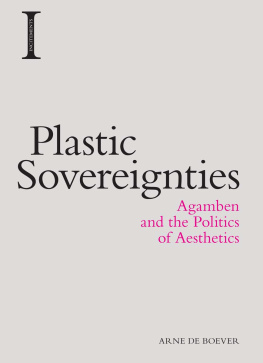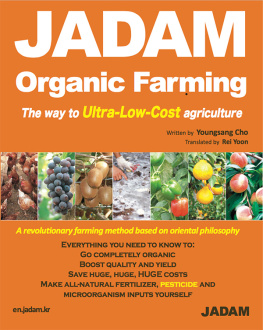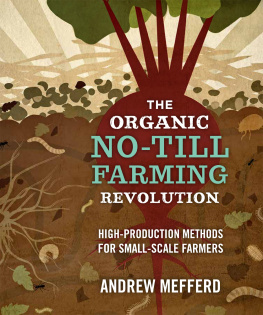CULTURE, PLACE, AND NATURE
Studies in Anthropology and Environment
K. Sivaramakrishnan, Series Editor
Centered in anthropology, the Culture, Place, and Nature series encompasses new interdisciplinary social science research on environmental issues, focusing on the intersection of culture, ecology, and politics in global, national, and local contexts. Contributors to the series view environmental knowledge and issues from the multiple and often conflicting perspectives of various cultural systems.
Organic Sovereignties
STRUGGLES OVER FARMING IN AN AGE OF FREE TRADE
Guntra A. Aistara
UNIVERSITY OF WASHINGTON PRESS
Seattle
Copyright 2018 by the University of Washington Press
Printed and bound in the United States of America
Composed in Warnock Pro, typeface designed by Robert Slimbach
22 21 20 19 18 5 4 3 2 1
All rights reserved. No part of this publication may be reproduced or transmitted in any form or by any means, electronic or mechanical, including photocopy, recording, or any information storage or retrieval system, without permission in writing from the publisher.
UNIVERSITY OF WASHINGTON PRESS
www.washington.edu/uwpress
LIBRARY OF CONGRESS CATALOGING-IN-PUBLICATION DATA ON FILE
ISBN (hardcover): 978-0-295-74310-3
ISBN (paperback): 978-0-295-74311-0
ISBN (ebook): 978-0-295-74312-7
Portions of the ethnographic materials and analysis have appeared in earlier versions in the following publications, which have granted permission to reuse these materials:
Maps from Space: Latvian Organic Farmers Negotiate Their Place in the European Union. 2009. Sociologia Ruralis 49 (2): 13250.
Seeds of Kin, Kin of Seeds: The Commodification of Organic Seeds and Social Relations in Costa Rica and Latvia. 2011. Ethnography 12 (4): 490517.
Privately Public Seeds: Competing Visions of Property, Personhood, and Democracy in Costa Ricas Entry into CAFTA and the Union for the Protection of Plant Varieties (UPOV). 2012. Journal of Political Ecology 19: 12744.
Weeds or Wisdom? Permaculture in the Eye of the Beholder on Latvian Eco-health Farms, in J. Lockyer and J. Veteto, eds. Environmental Anthropology Engaging Ecotopia: Bioregionalism, Permaculture, and Ecovillages . 2013. New York: Berghahn Press. 11329.
Latvias Tomato Rebellion: Nested Environmental Justice and Returning Eco-sociality in the Post-socialist EU Countryside. 2014. Journal of Baltic Studies 45 (1): 10530.
Cover photograph by Paul Morris, unsplash.com.
All interior photos by the author.
All maps by Pease Press Cartography. Maps of EU and CAFTA regions created using IndieMapper and with Mercator projection.
To my parents and my sister, Mra, Jnis, and Sandra
CONTENTS
FOREWORD
In what is arguably the first sustained ethnographic study of organic farming outside the United States, Organic Sovereignties builds its compelling narrative around two case studies from two continents. One is from Costa Rica and the other from Latvia, both identified despite their otherwise divergent histories as regional peripheries in this work, to present powerful cases about small farmers and their struggle to fashion meaningful agrarian livelihoods through their involvement in organic agriculture. By thus situating the quest for autonomy and dignity among farmers in both regions within national policies and processes of globalization, this study effectively operates on several levels of analysis. Organic agriculture, then, emerges in these countries as a product of both farmer mobilization and market forces, informed by the aspiration to achieve a viable future in small-scale farming but constantly responding to the wider pressures of markets, regulations, and international agreements.
There is a growing body of work by geographers, sociologists, and development studies scholars on organic farming, often focused on certification, marketing, and community-supported agriculture. There is also considerable interest in the pursuit of food sovereignty and various small-farmer responses to the vice-like grip industrial agriculture has on many of their lives. Guntra Aistara offers a creative amalgamation of these kinds of studies, made possible by her long-term ethnographic fieldwork in both countries.
The farmers in both locations are depicted in the midst of various struggles, not least to establish the viability of organic farming in view of enhancing their own control over their lives, even as they work to make food healthy and environmentally sustainable. Along the way, Aistara not only shows the parallels between Central America and eastern Europe but also undermines easy dichotomies between first and third worlds, new and traditional farming, or ideologies of the Left and the Right, as she depicts the political commitments of organic farmers.
Organic Sovereignties is resolutely interested in the intersecting history of organic agriculture as a social movement of farmers striving to find their place in regions and nations reshaped by world events. In the Latvian case the rural turbulence generated by the end of the Soviet Union created the opportunity for farmers to reconnect in the 1990s with land and home, and this created the space for organic farming to emerge as a possible pathway into independent small farming in the 2000s. In Costa Rica the harsh realities of economic reform and agribusiness created a milieu, also in the 1990s, where peasants rallied for their farming futures but also for local democracy and to protect their ability to lead a rural life of dignity, and food sovereignty activists combined with some of them to support and nurture interest in organic farming. Aistara vividly portrays the specific historical trajectories in each case, as farmers in both of her sites negotiate the fallout of industrial agriculture promoted during the Cold War and the expansion of commodity agriculture after the end of that war.
Aistaras astute treatment of the ecological consequences of organic farming and the legal disputes over land are informed by her command over debates in agrarian studies and environmental anthropology. Comparison of the social movements over seed collection and storage that emerged in both countries leads into a nuanced reassessment of the issue of graduated sovereignty, which receives its most sophisticated analysis since anthropologist Aihwa Ong wrote about the concept in very different contexts in Asia.
In her innovative comparison of organic agriculture across continents, focus on cases outside western Europe and North America, fine-grained and multiscalar ethnography, and elegant prose evoking the positive vision and loving labor of many farmers and their advocates, Aistara uncovers entirely new ground across a number of fields.
K. SIVARAMAKRISHNAN
Yale University
May 2017
ACKNOWLEDGMENTS
The process of research and writing for this book has been a personal journey intertwined with countless farmers, activists, scholars, students, friends, and family. While the writing and revising has kept me indoors at my computer for many more hours than I would have liked, the skills I learned from organic farmers along the way have also kept me sane, as pulling weeds and planting tomatoes in my own small garden allowed my thoughts about their journeys to slowly germinate, grow, and take root in this book.
I am grateful for financial support for field research and writing for this project from a Fulbright-Hays fellowship for the bulk of the field research; grants for preliminary and follow-up research trips from the University of Michigans Rackham Graduate School, School of Natural Resources and Environment, Center for European Studies, Advanced Study Center Seminar on Global Transformations, EU Center Handler Foundation, Center for European Studies, International Institute, and Center for Russian and East European Studies; writing support from the University of Michigan Rackham Graduate School, a University for Peace Faculty Professional Development Grant, the Central European University Research Support Scheme and a Central European University Faculty Research Grant, the European Social Fund Project Development Strategies and Changing Cultural Spaces in Rural Latvia, and a Yale University Agrarian Studies Fellowship.



